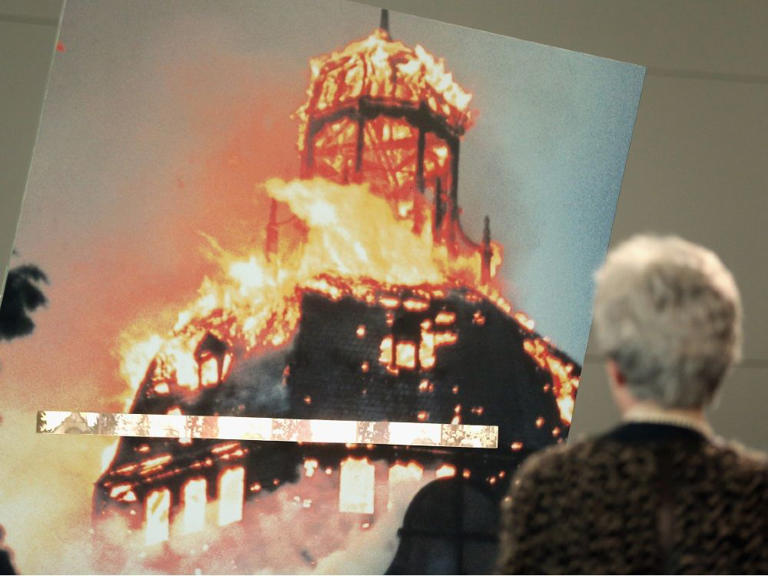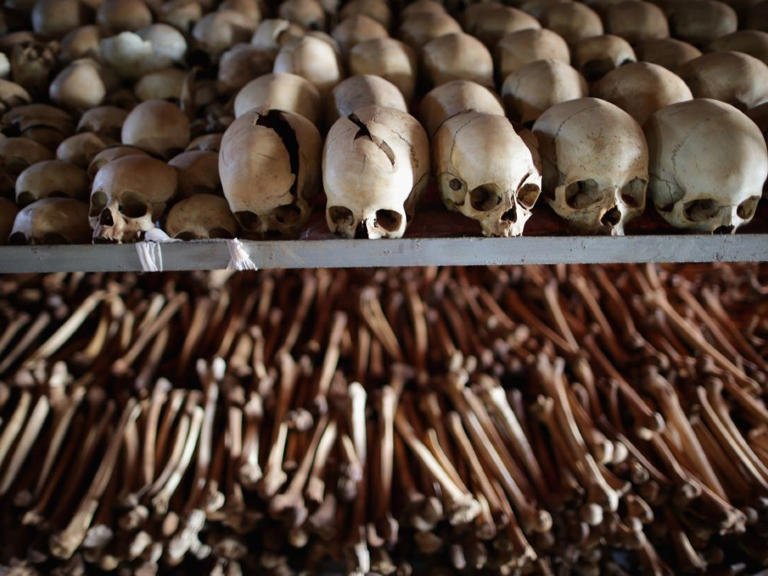Story by Tyler Dawson • NATIONAL PEST

A visitor looks at a photo of a synagogue burning during the 1938 Kristallnacht pogroms at an exhibit at the Topography of Terror museum in Berlin, Germany.© Provided by National Post
Around one-sixth of Canadians have no knowledge of any genocide, including the Holocaust, according to new polling from the Association for Canadian Studies.
The Leger poll was conducted the week of Sept. 25, just over a month before the 85th anniversary of Kristallnacht, a pogrom carried out overnight from Nov. 9 to Nov. 10 in 1938. Tens of thousands of Jewish men were incarcerated, nearly 300 synagogues were destroyed and thousands of Jewish businesses and homes were vandalized across Nazi Germany and its occupied territories.
Yet, the polling shows that 16 per cent of Canadians are unfamiliar with any genocides carried out in history. A further 11 per cent told pollsters they don’t know or would prefer not to answer, suggesting one-quarter of Canadians are either unfamiliar with a genocide or cannot answer the question.
“It suggests that continued need for education around genocide,” said Jack Jedwab, president of the Association for Canadian Studies.
Still, 73 per cent of Canadians did say they were familiar with at least one genocide.
Genocide, a term coined by Polish lawyer Raphäel Lemkin in 1944, is defined as acts intended to destroy a national ethnic, racial or religious group. It does not exclusively mean killing them, but also includes causing “serious bodily or mental harm” to members of the group, “inflicting … conditions of life” to destroy the group, preventing births within the group or “forcibly transferring children of the group to another group.”
“Generally speaking, genocide does not necessarily mean the immediate destruction of a nation, except when accomplished by mass killings of all members of a nation. It is intended rather to signify a coordinated plan of different actions aiming at the destruction of essential foundations of the life of national groups, with the aim of annihilating the groups themselves,” wrote Lemkin.
There are some age gaps in Canadians’ knowledge, the polling shows. Canadians aged 55 or older, at 79 per cent, are the most aware of a genocide in history. Those between 18 and 34 are the least aware (67 per cent), while 70 per cent of those between 35 and 54 say they’re aware of a genocide.
The Holocaust is the primary genocide that Canadians are able to identify.
When asked what first comes to mind, Canadians in every province except Quebec primarily identified the Holocaust with the word “genocide.” In Quebec, 32 per cent identified the Holocaust, while 36 per cent identified the Rwandan genocide, where as many as 800,000 members of the Tutsi ethnic minority were killed by Hutu militias in 1994.

Some showing signs of extreme trauma, victims’ skeletal remains are displayed inside the Ntarama Catholic Church genocide memorial in Nyamata, Rwanda.© Chip Somodevilla/Getty Images/File
In B.C., 38 per cent first identified the Holocaust. In Alberta, it was 56 per cent. In the two other prairie provinces it was 47 per cent. In Ontario, 38 per cent identified the Holocaust. In Atlantic Canada, it was 45 per cent.
In recent months, some provinces, including British Columbia and Ontario, have moved to make Holocaust education a mandatory part of the social studies curriculum. The topic is elective in Quebec, while Alberta is looking at strengthening its Holocaust education.
“The objective should be that everyone should be aware of genocide,” said Jedwab. “And, ideally, everyone should be aware of the Holocaust.”
Quebecers, the polling shows, are most familiar with genocides — 78 per cent of Quebecers are aware of one, or more, committed in history. This is followed by Alberta, where 77 per cent say they are aware of one. Seventy-one per cent of British Columbians and Ontarians are aware of a genocide, and 72 per cent of Atlantic Canadians. Just 69 per cent of those in Manitoba and Saskatchewan are aware of a genocide.
The Holodomor — the deliberate starvation of millions of Ukrainians under Soviet leader Joseph Stalin — was first identified by just one per cent of Canadians, while the genocide against Uyghurs in China was mentioned two per cent of the time.
About five per cent of Canadians said the genocide against North American Indigenous Peoples first came to mind. Five per cent also identified the Armenian genocide, the purge of Armenians in the Ottoman Empire during the First World War. Less than one per cent thought of the genocides in Cambodia under the Khmer Rouge, which killed around one-quarter of the Cambodian population between 1975 and 1979, or the Darfur genocide — the first genocide of the 21st century — that occurred in Sudan.
When asked to give two examples of genocide, the Holocaust also received a clear majority — 59 per cent — of responses, followed by the Rwandan genocide (38 per cent), the Armenian genocide (16 per cent), the genocide of Indigenous people in North America (15 per cent) and 12 per cent said the current Russian invasion of Ukraine, which Ukrainian President Volodymyr Zelenskyy has called a genocide.
The polling was done between Sept. 25 and 29 via a web panel with 1,502 Canadians. A margin of error cannot be associated with a non-probability sample in a panel survey, but, for comparison purposes, a probability sample of 1,500 respondents would have a margin of error of plus or minus 2.5 per cent, 19 times out of 20
Is it a war crime to kill civilians? Only sometimes. Here's what international law really says
No comments:
Post a Comment